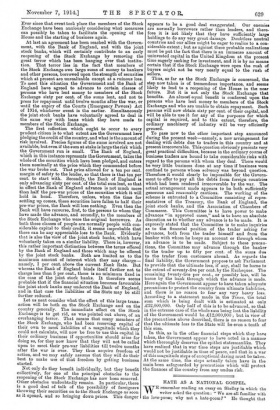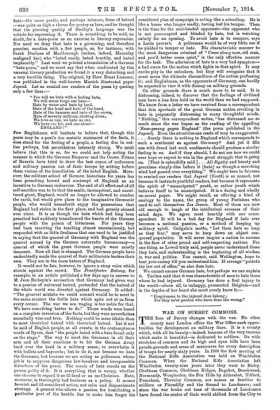HATE AS A NATIONAL GOSPEL. - N AT E remember reading an
essay on Shelley in which the writer asked the question : "We are all familiar with tho love-poem; why not a hate-poem?" He thought that
hate—the more poetic, and perhaps intense'', form of hatred —was quite as high a theme for poetry as love, and he thought that the piercing quality of Shelley's language was the vehicle for expressing it. There is something to be said, no doubt, for a hate-poem as an exercise in literary expression.
Nor need we deny that hate is a governing, and therefore genuine, emotion with a few people, as, for instance, with Sarah Duchess of Marlborough (unless, indeed, Macaulay maligned her), who "hated easily, hated heartily, and hated implacably." Last week we printed a translation of a German "hate-poem," and we must say that when confronted by this unusual literary production we found it a very disturbing and a very horrible thing. The original, by Herr Ernst Lissauer, was published in the well-known Munich illustrated paper Jugend. Let us remind our readers of the poem by quoting only a few lines :—
" You will we hate with a lasting hate, We will never forgo our hate— Hate by water and hate by land, Hate of the head and hate of the hand, Hate of the hammer and hate of the crown, Hate of seventy millions, choking down; We love as one, we hate as one, We have one foe, and one alone—
ENGLAND !"
Few Englishmen will hesitate to believe that, though this poem may be a poet's too ecstatic statement of the facts, it does stand for the feeling of a people, a feeling dim in out- line perhaps, but nevertheless intensely strong. We must believe that this is so, for we could not help noting the manner in which the German Emperor and the Crown Prince of Bavaria have tried to draw the last ounce of endurance and military passion out of their troops by setting before them visions of the humiliation of the hated English. More- over, the militant school of German historians for years has been preaching hatred and contempt of England as an incentive to German endeavour. The end of all effort and of all
self-sacrifice was to be that the senile, incompetent, and uncul- tured giant, England, would no longer be allowed to cumber the earth, but would give place to the imaginative Germanic people, who would henceforth enjoy the possessions that England had stolen in the first place, and had grossly abused ever since. It is as though the hate which had long been preached had suddenly transformed the hearts of the German people with the poison of bitterness. For years they had been receiving the teaching almost unconsciously, but responded with so little liveliness that one used to be justified in saying that the quarrel of Germany with England was the quarrel nursed by the German autocratic bureaucracy—a quarrel of which the great German people were mostly innocent. Now all that is changed. The German people have undoubtedly made the quarrel of their militaristic leaders their own. They are in the mass haters of England.
It would not be fair, however, to ignore a stray voice which shouts against the crowd. The Franlfurter Zeitung, for example, in an article published a few days ago in answer to M. Jean Richepin's accusation that Germany had given way to a passion of universal hatred, pretended that the hatred of the whole world was directed against Germany. It added : "The greatest mistake we could commit would be to meet in the same manner the futile hate which spits out at us from every corner. The war we are waging is too noble for that. We have something better to do." Those words were based on a complete inversion of the facts, but they were nevertheless essentially wise and true. Nothing could be more idiotic than to meet theatrical hatred with theatrical hatred. Let it not be said of English people, at all events, in the contemptuous words of Byron, that "the people hated with a hate found only on the stage." The way to meet the Germans in all their acts and all their emotions is to bit the German Army bard over the head in a military sense ; to overwhelm it with bullets and bayonets ; but to do it, not because we bate the Germans, but because we are acting as policemen whose job is to suppress dangerous law-breakers and irresponsible disturbers of the peace. The mania of hate recoils on the person guilty of it. It is everything that is wrong, whether one chooses to regard it as ill-bred or as un-Christian. Hate, moreover, is thoroughly bad business as a policy. It means feverish and ill-considered action, not calm and dispassionate strategy. A general who allows a passion for humiliating a particular part of the hostile line to make him forget his
considered plan. of campaign is acting like a schoolboy. He is like a boxer who lunges madly, having lost his temper. Then is the time for the cool-headed opponent—the opponent who is not preoccupied and blinded by hate, but is watching calmly for an opening. To avoid hate is to conquer, says a Latin proverb. A policeman would be of very little use if he yielded to temper or hate. His characteristic manner to the most dangerous criminal of "Come along now, old man, and you'd better come quiet," is the only effective manner for the task. The admission of hate is a very bad symptom— a bad omen for the nation which fights in that spirit. It may excite pity in the onlookers, but they will recognize that it must mean the ultimate discomfiture of the nation professing it ; and Englishmen, as the opponents of Germany, can hardly be expected to view it with dismay on military grounds.
On other grounds there is much more to be said. It is distressing, indeed, to discover that the feelings of civilized men have a less firm hold on the world than we had supposed. We know from a letter we have received from a correspondent that this spectacle of the great German nation revelling in hate is poignantly distressing to many thoughtful minds. "Nothing," this correspondent writes, "has distressed me so much since the war began as the reading of the appalling Hass-gesang gegen England' (the poem published in the Jugend). Even the atrocities one reads of may be exaggerated. . . . Surely there is nothing in England which corresponds to such a sentiment as against Germany? And yet it fills One with dread lest such sentiments should produce a similar feeling in us. And if they should, I do not see how we could ever hope or expect to win in the great struggle that is going on. [That is splendidly said.] .. . All dignity and beauty and greatness simply dies before it [hate] as though a scorching wind had passed over everything." We ought here in fairness to remind our readers that Jugend (Youth) is so named, not because it instructs youthful readers, but because it represents the spirit of " emancipated " youth, or rather youth which believes itself to be emancipate& It is a daring and wholly un-moral paper. We might recall, as offering a kind of analogy to the name, the group of young Parisians who used to call themselves Les Jeunes. Most of them are now old enough to laugh at the intellectual excesses of their salad days. We agree most heartily with our corre- spondent. It will be a bad day for England if hate ever becomes a national passion, or a method of keeping up military spirit. Caligula's motto, "Let them hate so long as they fear," may serve to keep down an abject con- quered population. It will never inspire a nation to success in the face of other proud and self-respecting nations. For one thing, as Lowell truly said, people never understand those they hate, and understanding is the beginning of all wisdom in war and politics. You cannot, said Wellington, hope to beat your enemy till you understand him. If revenge "putteth the law out of office," so also does hate.
We cannot excuse German hate, but perhaps we can explain it. Tacitus said that it was characteristic of man to bate those whom he had injured. Germany has done a foul injury to the world—above all, to unhappy, persecuted Belgium—and in the depths of her heart she must surely know it:— " Forgiveness to the injured does belong ; For they ne'er pardon who have done the wrong."















































 Previous page
Previous page